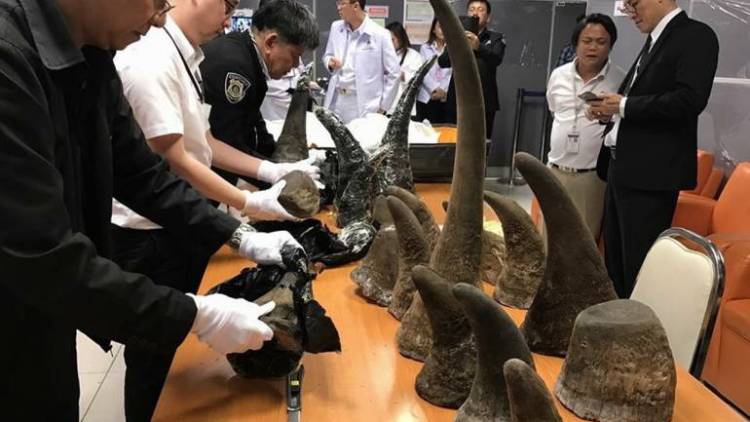It was all over the news last Tuesday that Thai customs confiscated 21 rhino horns with an estimated value of nearly USD5 million (THB176 million), the biggest seizure of its kind in Thailand in years.
The country is now investigating whether a senior justice official and two police officers were working in tandem with the smugglers, helping them to pass the horns through Suvarnabhumi Airport by providing police escorts for the contraband.
The trio being probed includes a deputy state provincial prosecutor. The three officials seemed to appear to escort the two female alleged smugglers as they arrived at the airport, their bags bulging with horns from critically endangered rhinos.
When suspicious customs officers checked their bags despite their possible police escorts, the women fled, leaving authorities to review CCTV footage to find clues about their identities and movements.
While reviewing the footage, they first saw the officials walking along the concourse with the luggage containing the horns.
So far, only one of the suspected officials has been identified, a deputy state prosecutor for Saraburi province, Pol. Maj. Worapas Boonsri. He has since been placed on inactive duty pending investigation, according to Thai PBS.
Thailand’s junta swears it is committed to cracking down on wildlife contraband trafficking. The country acts as a convenient gateway to Southeast Asian and Chinese markets where rare species are coveted as pets or as ingredients in traditional medicines.
Steven Galster, director of anti-trafficking group Freeland, applauded Thai authorities for probing possible links between officials and organized crime but noted, “Wildlife poaching and trafficking on the huge scale we are seeing, especially with rhinos, cannot happen without the help of well-placed corrupt officers.”
The horn that was confiscated last week came from Africa, and though it was a large haul, these crimes are hardly uncommon.
Earlier this month, Thai customs displayed 422 pieces of elephant ivory that was also discovered at Suvarnabhumi Airport after coming off of two Ethiopian Airline flights from Addis Ababa.
In 2015, Thailand incinerated more than two tons of confiscated ivory, the first time the country has destroyed part of its holdings.
The Bigger Picture
The USD5 million worth of poached rhino horn smuggled through the airport could be linked to corrupt officials on a larger scale, according to results from a study that named assistance by underhanded airport workers to be a major obstacle to stopping wildlife contraband trafficking.
Freeland, an anti-trafficking organization based in Bangkok, studied several wildlife smuggling cases over the last year and found that rhino horn, elephant ivory, pangolin scales, and other endangered species contraband is being helped through airports by officials working in major ports in both Africa and Asia.
If this is the case, other illegal cargo; such as drugs, trafficked humans and terrorists; could just as easily be ushered through airports by the same corrupt networks.
Freeland believes it has identified seven airports in Africa and Asia where staffers were involved allowing endangered wildlife contraband to pass through.
The wildlife traffickers pay bribes to workers on all levels to get their illegal cargo through security and to have documents changed to fool inspectors. Those working on the ground as baggage handlers may also help, moving and keeping track of the illegal shipments.
“We found in many cases that baggage is being switched, re-tagged, and even moved onto tarmacs and then onto planes before a plane takes off to throw off inspectors,” said Galster.
Story: AFP/Freeland




